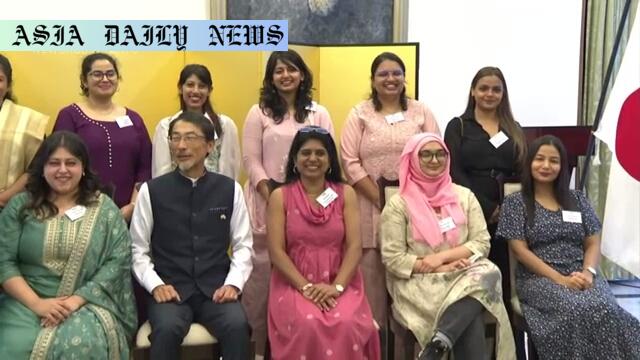Japan-India Exchange: Fourteen Indians embark on their journey to Japan as assistant English teachers, fostering grassroots bonds.

Japan Welcomes Indians as Language Facilitators
In a remarkable gesture of cross-cultural cooperation, Japan has opened its doors to 14 young Indians to work as assistant English-language teachers under a government-sponsored program initiated in 1987. The program, designed to enhance foreign-language education and international exchange, signals a growing partnership between Japan and India, as the two nations continually strive for stronger ties. The recently held send-off ceremony at the Japanese Embassy in New Delhi underscores this enduring relationship.
The demand for effective global communication has made foreign-language education vital. By bringing in skilled Indian assistants, the Japanese educational system hopes to raise English language standards, while also benefiting from unique cultural perspectives these teachers offer. Participants like Srishti Taneja passionately express their deep hopes of acting as cultural bridges between the nations, emphasizing how small acts of cultural exchange culminate in lasting relationships.
A Step Towards Stronger Japan-India Relations
Japan’s Ambassador to India, Ono Keiichi, commended the initiative as a foundational step in grassroots exchanges between the two countries. Rooted in the shared goal to strengthen global knowledge connections, his sentiments underline a mutual commitment to building bridges of trust and cooperation. The presence of these dynamic individuals at schools and local governments across Japan sets an example of how education can transcend borders.
Since its inception in 1987, this initiative has contributed significantly to fostering international cooperation. With over three decades of success, the decision to welcome young Indians into this established network comes at a pivotal time, as geopolitical and economic collaborations between India and Japan are on the rise. Working alongside local educators and communities, these Indian professionals are poised to make meaningful contributions in promoting English education and cross-cultural dialogue.
Nurturing Global Peace and Understanding
The inclusion of these 14 Indians in Japan’s educational landscape does more than enhance linguistic capabilities. It sets a precedent for nurturing global peace and understanding through interpersonal cultural connections. Programs like these lay a foundation where diversity is not only celebrated but also integrated into the fabric of society. The Japanese classrooms will likely become melting pots of traditional exchange, enabling students to interact with a wide array of perspectives and ideas.
This initiative reflects broader global trends of investing in educational diplomacy. Nations increasingly understand that fostering interpersonal relationships through educational exchange holds immense potential for promoting long-term goodwill. By reinforcing ties at the grassroots level, Japan and India continue to model how collaborative efforts in education can transform international relationships.
A Mutual Learning Experience
While the assistant teachers contribute their knowledge of the English language, they are also presented with opportunities for personal and professional growth through immersion in Japanese culture. Participants are likely to acquire new skills, as they navigate life in a different country while effectively balancing their teaching responsibilities. This mutual exchange ensures that the benefits do not solely rest on one side; both nations significantly gain from shared knowledge and experiences.
The transformative potential of such collaborations cannot be overstated. For the Indian teachers, learning Japan’s customs, traditions, and work ethics opens an array of professional and cultural virtues. At the same time, their impact in classrooms fosters mutual appreciation, respect, and academic excellence.
Commentary
A Foundation for Stronger Global Relations
The decision to bring Indian assistant teachers to Japan is not just an educational effort, but also a movement fostering profound global unity. It addresses the common diplomatic goal of strengthening ties at the grassroots level. Programs like these imply a belief in people-to-people connections, underscoring how governments can intertwine community and policy for greater success.
What stands out about this initiative is its focus on mutual benefit. While the Japanese education system gains from improved English instruction, Indian participants also engage in an unparalleled learning experience, gaining life skills, cultural perspectives, and international exposure. This becomes a win-win program for both nations and its people.
Education as Diplomacy
Education has long been recognized as a powerful tool for fostering diplomacy. In this case, placing young, vibrant Indian individuals into the heart of Japanese academic and community life allows for direct interaction. This connection results in mutual respect, understanding, and partnership. It is heartening to see Japan embracing this approach to deepen its ties with India in such a meaningful manner.
Programs like these should encourage other nations to adopt similar cultural exchange initiatives. The intermingling of knowledge, perspectives, and philosophies has the capacity to build long-lasting bridges that go beyond mere words.
Looking Ahead with Optimism
As these 14 individuals embark on their journeys, their experiences are bound to inspire more people in both nations to explore opportunities beyond borders. Initiatives like this reinforce hope in a future driven by collaboration, empathy, and shared growth. They embody a vision of global unity where education goes beyond classrooms, creating connections that last a lifetime.


